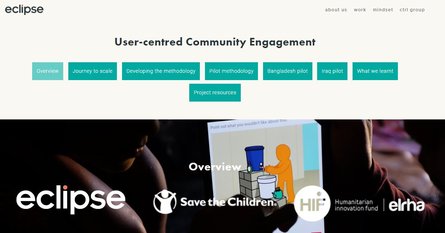
Meaningful involvement of crisis-affected people in humanitarian action is a persistent problem for aid organisations. In recent years system-wide commitments on accountability to affected people, e.g., the Core Humanitarian Standard, have spurred much activity in this area. A variety of tools, methods and guidelines are available to humanitarian actors and more people are consulted about the aid they receive, yet these consultations are limited and rarely have a clear effect on response plans, particularly at the design stage of the programme cycle (ALNAP 2014, 2018).
In 2018, a review commissioned by HIF found that in sanitation facilities design “engagement of affected communities ... is patchy and weak [and] is often little more than cursory consultation – or that it often doesn’t happen at all” in the first few weeks of an emergency (Sandison 2018). In response to the HIF WASH Innovation Challenge, Eclipse Experience and Save the Children developed the User-Centred Community Engagement (UCCE) methodology to address this gap.